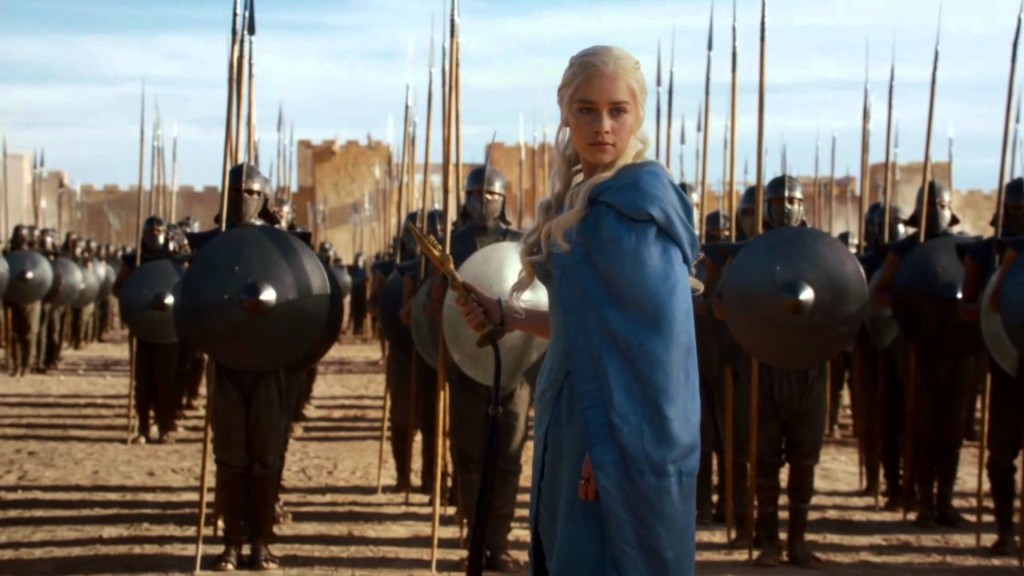Month: March 2014
The Women of Game of Thrones
“All men must die. But we are not men…” — Daenerys Targaryen
We don’t have HBO, so were late getting into Game of Thrones, only starting to watch it after I accidentally stumbled across a copy [let’s just say, it had Chinese subtitles…]. Being tardy has its benefits: we could binge watch our way through multiple episodes, and I’m wondering how we’ll cope having to join the masses for Season 4, rationed to one episode per week. And it appears we were not alone: it’s one of the rare cases were a show has grown much more popular over time. The first ever episode was watched by only 2.22 million people on HBO. The second season opened 74% higher, at 3.86 million, and by the time the third series ended, viewing figures all the way up at 5.39 million. This mirrors the pattern of the books by George R.R. Martin on which the series is based: the first wasn’t a hit at all on its publication in 1991. But by the end of July 2011, he had five books in the New York Times top 20 bestsellers for fiction.
It’s utterly addictive, and populated with any number of great characters; indeed, some kind of scorecard would probably help in the early going, to keep track of who is marrying, supporting, invading or killing whom. Perhaps the outstanding aspect for me is the way characters are nuanced, something especially noteworthy for the villainous. Even as they are committing heinous acts, you usually understand the reasons why they’re doing them. If you may not agree with the purpose to which they are aimed, you can see the justification. Well, except for boy-king Joffrey. He’s just a little shit, who has somehow managed to avoid the claws of the grim reaper. And speaking of which, another defining factor of the series is: anyone can die, at any time. No matter how beloved, Mr. Martin does not care. You can traumatize any GoT fan by sidling up to them and whispering two words in their ear: “Red Wedding.” I’ll say no more than that.
“The more people you love, the weaker you are.” — Cersei Lannister
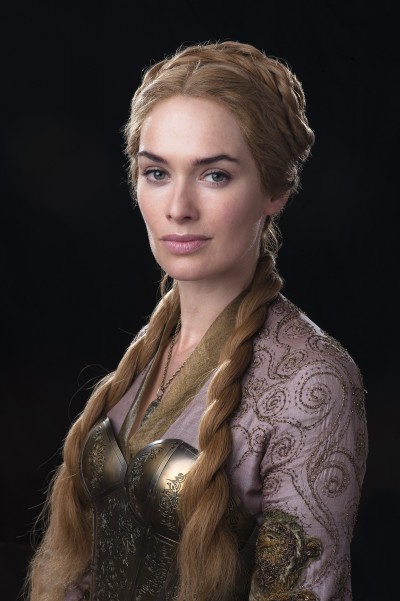 It certainly is a show ‘for mature viewers,’ containing its fair share of violence and sex, which has naturally led to the usual accusations of the usual misogyny from the usual sources. I don’t think the reality is anywhere near as simple as this, not least because the creators are pretty much equal opportunity when it comes to character abuse. Sure, sexual assault is skewed towards the women; decapitation, on the other hand, is pretty much a male preserve. No-one gets out unscathed: man, woman, child or wolf. There’s also an obvious difference between depiction and endorsement. And it’d be kinda ludicrous to have a medieval-styled fantasy world, operating as some kind of anarcho-syndicalist commune, where people take it in turns to be a sort of executive officer for the week, but all the decisions of that officer have to be ratified at a special bi-weekly meeting. Boring as shit, too.
It certainly is a show ‘for mature viewers,’ containing its fair share of violence and sex, which has naturally led to the usual accusations of the usual misogyny from the usual sources. I don’t think the reality is anywhere near as simple as this, not least because the creators are pretty much equal opportunity when it comes to character abuse. Sure, sexual assault is skewed towards the women; decapitation, on the other hand, is pretty much a male preserve. No-one gets out unscathed: man, woman, child or wolf. There’s also an obvious difference between depiction and endorsement. And it’d be kinda ludicrous to have a medieval-styled fantasy world, operating as some kind of anarcho-syndicalist commune, where people take it in turns to be a sort of executive officer for the week, but all the decisions of that officer have to be ratified at a special bi-weekly meeting. Boring as shit, too.
Indeed, perhaps the oppressive world is a seed for the admirable number of strong female characters, which likely surpasses just about any other show on television these days. If you’re a man, you can be remarkably stupid and still do well in the GoT world, as long as you are fairly good at hitting people: Exhibit A, Jon Snow. As a woman, if you’re dumb, you learn quickly, or you don’t survive. If you’re weak, you don’t survive. Since you generally don’t have the option of direct physical force, other means must be found to bend others to do your will. This need not be malicious: Catelyn, matriarch of the Stark family, used family ties and other appeals to loyalty to amass her army. Others are less high-minded; to quote Cersei Lannister, “Tears aren’t a woman’s only weapon. The best one’s between your legs.” And make no mistake, some of the ladies in GoT are perfectly willing to use it, as part of their arsenal of tools.
But only some, for the variety of characters on offer here is another delight, from whores to high priestesses, queens to barbarians (even barbarian queens!), five foot short to six foot three tall, ages nine to eighty and everywhere in between. As the fourth season starts up on Sunday, here are our ten favorites ladies in the Game of Thrones universe to date – in increasing order of action heroineiness. Note: I’ll try and avoid major spoilers – for example, which if any of these are no longer alive! – but where these are necessary to illuminate a character, I’m not going to shy away from them.
“Some day I’m going to put a sword through your eye and out the back of your skull.” — Arya Stark
10. Shae
In terms of social climbing, few can surpass Shae’s ascent. She started off as a prostitute following the Lannister army, but caught the eye of Tyrion Lannister (our most beloved character thanks to Peter Dinklage’s portrayal, the self-proclaimed “god of tits and wine”) and became his exclusively – she even convinced Tyrion to defy his father and bring her to the capital. There, she now serves as a handmaiden and confidant to Sansa Stark, the one-time potential queen of the realm. Yep, Shae has come a long way.
9. Olenna Tyrell
While certainly “veteran presence,” we mentioned above that you don’t survive in this world without being smart and tough. So her lengthy tenure at the heart of court politics testifies to both, as does her nickname, the ‘Queen of Thorns.’ In many way, she’s the real head of House Tyrell, despite marrying into it, rather than through her birth. Besides, we couldn’t omit any character played by Diana Rigg, who was not just the only Mrs. James Bond (in O.H.M.S.S.), but one of the all-time GWG icons, Emma Peel.
8. Melisandre
If there’s one thing more disturbing than your average religious zealot, it’s a religious zealot, with supernatural powers, who burns people alive. That would be Melisandre, a Red Priestess of the Lord of Light, a religion that has found devotees in House Baratheon, and who has an absolute conviction in her faith, to go along with her abilities of prophecy. You get the sense there’s a lot more to her than has been seen to date, but anyone capable of giving birth to shadows that kill on command, is clearly someone to be treated with respect.
“Death by fire is the purest death” — Melisandre
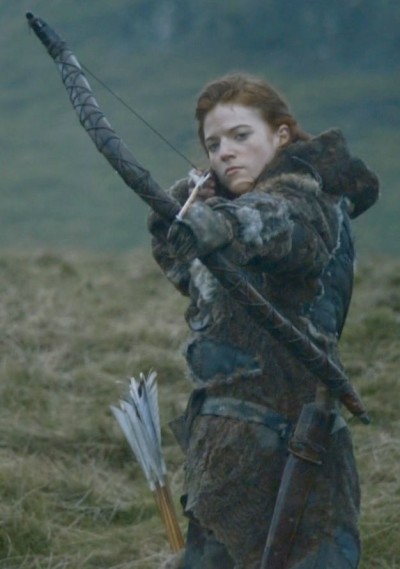 7. Ygritte
7. Ygritte
A free woman from north of the massive wall which protects the bulk of Westeros from… things, shall we say. Life up there is even more brutal, and her survival skills have helped both her and Jon Stark, with whom she has a relationship best described as “complex.” Like others from her society, she possesses a fierce independence, and her loyalty is not easily won. She has an instinctive grasp of the best way to achieve her ends, and will ruthlessly exploit any weakness. If that fails – well, there’s always her trusty bow.
6. Catelyn Stark
At first, she was a dutiful and supportive wife to husband Eddard, but Lady Stark was thrust to the front following his appointment as the King’s Hand, which eventually led to his execution after the death of the current king. As the country collapses into civil war, she strives to be reunited with her children, rallies forces against those responsible for Eddard’s death, and acts as an adviser to her son Robb, who is heading the army they have raised. Balancing these various ends is a perilous task, to say the least.
5. Yara Greyjoy
After a previous rebellion was suppressed, the Greyjoy scion, Theon, was sent off as a hostage to live with the winners, to ensure his family’s future compliance,. This forced his sister, Yara, to step into the breach and become a son by proxy, commanding her own longship and leading her men as they pillage nearby territories. To quote her father: “She’s commanded men. She’s killed men. And she knows who she is.” That’s more than Theon does, completely failing to recognize the hard-ass she has become, when he returns, after almost a decade away.
4. Cersei Lannister
Cersei is played by another solid action heroine, Lena Headey having been Queen Gorgo in 300, as well as the title role in Terminator: The Sarah Connor Chronicles. Her character is responsible for the show’s title, saying, “When you play the game of thrones, you win or you die.” And Cersei Lannister has no intention of dying, being a grand mistress at the arts of scheming, manipulation and intrigue towards her goals. Her son Joffrey is technically on the throne of Westeros, but there’s little doubt who is wielding the actual power there.
“Everyone who isn’t us is an enemy.” — Cersei Lannister
3. Arya Stark
We’re in the top tier now, and despite Arya’s youth, she undeniably deserves her position up here. Virtually the first time we see her, she’s spurning her embroidery lesson to out-shoot her brothers, and that sets the tone for her character. Per Wikipedia, “She rejects the notion that she must become a lady and marry for influence and power, showing no interest in the womanly arts of dancing, singing, and sewing; instead she revels in fighting and exploring.” Her father, Eddard, eventually admits defeat in this area, and hires a swordmaster to give her lessons in “sticking ’em with the pointy end,” an art in which Arya proves adept.
She goes with Eddard when he travels to take up his position as the King’s Hand, but when that goes pear-shaped, she’s thrown back entirely on to her own resources, with her sword, ‘Needle’. Disguising herself as a boy to avoid some of the dangers of life alone, she starts back to her family’s castle in the North. That plan is derailed and she ends up embedded deep in the enemy’s camp, acting as cupbearer to Tywin, the head of House Lannister, before escaping. At the end of the third season, Arya killed her first man, stabbing him repeatedly in the back of his neck. It’s not going to be her last, that’s for sure.
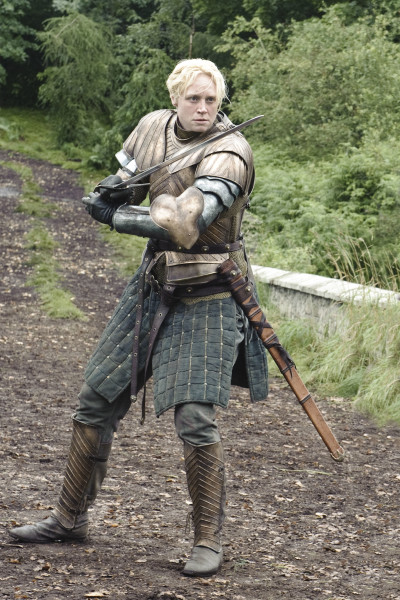 2. Brienne of Tarth
2. Brienne of Tarth
The only child of her lord father, Brienne is bigger and stronger than most men [Gwendoline Christie, who plays her, is 6’3″ in real life, so no need for orange boxes or forced perspective there!], and we first see her winning a tournament against male opponents. This gains her entry in to the Kingsguard of Renly Baratheon, but after his assassination, she is blamed for Renly’s death and has to flee the camp, vowing to take revenge on the real instigator – who would be #8, Melisandre. Brienne swears loyalty to Catelyn Stark, and is given the mission of taking captive Jamie Lannister back to King’s Landing, where he can be exchanged for Catelyn’s daughters. That journey forces both Brienne and Jamie to face uncomfortable truths, and they develop a mutual respect.
Characters in the show are very much shaded in grey, but Brienne is perhaps the closest to being purely good, holding to a chivalric ideal of knighthood, likely more rooted in fantasy than the harsh realities of life. She has managed to hold on to her idealism, despite never being accepted by her fellow knights, or society in general: her position as a warrior woman renders her a perpetual outsider to both groups. In one of the books, she says she was “the only child the gods let [my father] keep. The freakish one, one not fit to be son or daughter.” A great character, beloved beyond the screen time she has received, and I’d love to see a spinoff series, focusing on Brienne.
1. Daenerys Targaryen
The Targaryen clan used to be the rulers of Westeros, but her father was overthrown, leaving Daenerys and her brother Viserys surviving out on the edge of civilization. Viserys still plots to regain the throne, and to this end, arranges a marriage of his sister to a barbarian warlord, Khal Drogo, hoping to use Drogo’s army. Drogo dies after a wound sustained in battle becomes infected, and most of his tribe abandon their queen. However, at this low point, Daenerys discovers her destiny, walking into her husband’s funeral pyre, only to emerge unscathed. Indeed, she succeeds in hatching three supposedly inert dragon eggs given to her as a wedding present, resurrecting a species much feared in their time, yet considered extinct for centuries. The ‘Mother of Dragons’ is on her way back up…
Having not read the books when I watched the series, my initial reaction was that Viserys would be the focus, and Daenerys little more than eye-candy, a bribe used to give her sibling leverage, who’d rapidly be sidelined. Boy, was I wrong. From a chattel, she has steadily ascended the ladder of power, first winning her husband, then his clan, and building upon that, with some help from her little fire-breathers, to become a potential force to be reckoned with. While she is still sidelined – Daenerys hasn’t even set foot on Westeros through three seasons – it’s only a matter of time before she returns at the head of an army, fanatically devoted to her. How do you like your soldiers cooked? Medium-well?
She hasn’t forgotten where she came from either, and has a zero-tolerance policy for those who oppress others. Daenerys has gone from, “I don’t want to be his Queen. I want to go home,” to “Slay the masters, slay the soldiers, slay every man who holds a whip, but harm no child. Strike the chains off every slave you see!” That’s what I call a character arc. But I do have to wonder what the future holds for her, because we should remember, her father was nick-named “The Mad King” by his subjects in Westeros, for good reason, and Viserys wasn’t exactly stable or sane. Let’s hope the insanity skips a generation: it’d waste one of the strongest and most memorable female characters on TV this decade
“We will lay waste to armies, and burn cities to the ground.” — Daenerys Targaryen
Punch Lady
★★★
“Battered wife = comedy gold. Or not.”
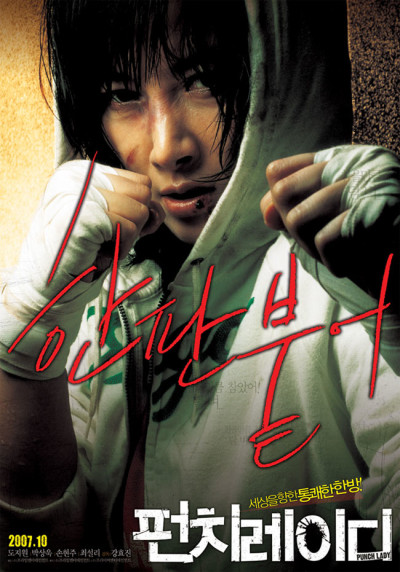 Not unlike The Opponent, this centers on a battered woman, who takes up the pugilistic arts in an attempt to regain control of her life. The big difference here is that, for a great chunk of its running time, this is played for laughs. Yeah: spousal abuse as a topic for broad comedy. Oh, those wacky Koreans! Sarcasm aside, it makes for somewhat uncomfortable viewing, simply because such an approach would be almost inconceivable as a mainstream project in the West, due to the backlash. And this certainly was mainstream in Korea, getting a wide, national release – though it bombed, with its box-office performance described as “shockingly bad.” So maybe the Koreans aren’t quite as different from us after all…
Not unlike The Opponent, this centers on a battered woman, who takes up the pugilistic arts in an attempt to regain control of her life. The big difference here is that, for a great chunk of its running time, this is played for laughs. Yeah: spousal abuse as a topic for broad comedy. Oh, those wacky Koreans! Sarcasm aside, it makes for somewhat uncomfortable viewing, simply because such an approach would be almost inconceivable as a mainstream project in the West, due to the backlash. And this certainly was mainstream in Korea, getting a wide, national release – though it bombed, with its box-office performance described as “shockingly bad.” So maybe the Koreans aren’t quite as different from us after all…
The heroine is Ha-eun (To), who has the misfortune to be married to Joo-Chang (Park) and his vicious temper. Worse still, he’s a champion in mixed martial-arts, and doesn’t hesitate to use his ring skills on her and their daughter (Choi). But when he kills an opponent, an ex-boyfriend of Ha-eun, she storms the post-fight press conference, berating him and challenging him to fight her in the ring, rather than outside it. He agrees to do so, with one hand literally tied, and the custody of their daughter going to the winner. No legitimate trainer will touch her, but she finds a much more dubious coach in Soo-hyeon (Son), who is actually her daughter’s Math teacher, and is about to turn the gym into a nursery. However, funded by her ex-boyfriend’s life-insurance policy, of which she was the beneficiary, Ha-eun makes Soo-hyeon a generous offer. He accepts, taking classes at from Joo-chang’s gym, so he can stay one step ahead of his pupil as he trains her for the big fight.
Of course, a huge amount of disbelief needs to be suspended here, not least in the assertion that any legitimate MMA organization would sanction such a match – nothing good could come of it – or that someone (regardless of gender) could go toe-to-toe with an MMA champion, after only a few weeks of training from a clueless adviser. Not happening. It’s also hugely uneven in tone, an almost inevitable flaw as a result of the decision to take the story and treat it largely as the basis for goofy antics. This is at odds with the opening, and also the battle at the end, which is genuinely uncomfortable to watch, as Joo-Chang beats the shit out of Ha-Eun (at least initially; I don’t think saying so deserves classification as a spoiler). I have to say, Kang does a fabulous job of shooting the fight itself: whatever the other weaknesses, he nails it, keeping things interesting and tense throughout. The rest, however, probably needed to go in some different directions to be successful; perhaps, play up the media hysteria more. That said, I think I can say, with a fair degree of confidence, you won’t have seen anything quite like this, and even for that alone, this deserves credit.
Dir: Hyo-jin Kang
Star: Ji-Won To, Sang-Wook Park, Hyeon-ju Son, Seol-ri Choi
The Opponent
★★
“Lacking in punch.”
 Patty (Eleniak) is in an abusive relationship, but finds an outlet through an unconventional source – boxing. This comes through her friend June (Ellis), who works occasionally as a ring-girl for a promoter (Doman). One of his fighters is Tommy (Colby), a part-time boxer whose main source of income is as a limo driver, but also helps run a gym in the upstate New York city of Troy, which helps keep the local kids out of trouble. Reluctantly, he agrees to train Patty, who develops, not only physical strength as a result, but the self-confidence to handle her situation.
Patty (Eleniak) is in an abusive relationship, but finds an outlet through an unconventional source – boxing. This comes through her friend June (Ellis), who works occasionally as a ring-girl for a promoter (Doman). One of his fighters is Tommy (Colby), a part-time boxer whose main source of income is as a limo driver, but also helps run a gym in the upstate New York city of Troy, which helps keep the local kids out of trouble. Reluctantly, he agrees to train Patty, who develops, not only physical strength as a result, but the self-confidence to handle her situation.
If only she used it. This is the kind of story which feels like it could have been a Lifetime or Hallmark TV movie, but the makers appear to be opting for something slightly grittier, though it rarely gets far away from tired clichés, You just know that Patty and Tommy are eventually going to fall into bed with each other; the pacing here might have been better had they done so sooner, rather than later, as this does then add a different dynamic to their relationship. The other problem is that Eleniak, despite dirtying-up for the role, is rarely even remotely convincing as a boxer: there’s a difference between “fit” and “fit for battle.” This is never clearer than when facing her nemesis, Red Lennox – she’s played by Andrea Nelson, a real boxer, who went 7-0 in 2000, the year this was made, and the difference in physique is painfully obvious. One person is playing a role; the other is living a life, and the obvious gap makes it hard to suspend disbelief.
I actually quite liked the performances: Doman has something of the late James Gandolfini about him, Colby is engaging and, perhaps surprisingly, Eleniak holds her own. [I was going to say I’d only ever seen her in Baywatch, but I then remembered her role in another GWG flick, Lady Jayne Killer] However, the decent sense of character development comes largely at the expense of a narrative that meanders aimlessly in circles, before petering out in an ending that might have been deliberately created to provoke a reaction of “Huh,” given the lack of closure to any of the major threads woven into the storyline. As a character study, this is fine; however, the lack of dramatic energy saps the interest and leaves it looking rocky, rather than Rocky.
Dir: Eugene Jarecki
Star: Erika Eleniak, James Colby, Aunjanue Ellis, John Doman
First Shot
★½
“Legally blonde”
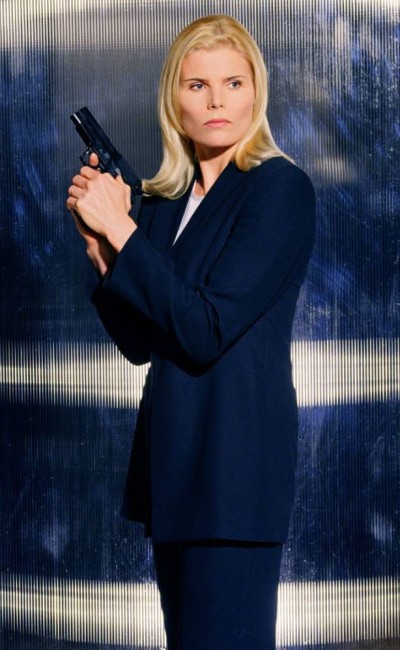 The low score for this is partly not entirely the film’s fault. Despite the title, it’s actually the third entry in a series of TV movies – following First Daughter and First Target. All focus on blonde Secret Service agent Alex McGregor, charged with protecting the President and his family. However, only this one is available on Netflix, which is where I picked it up: had I known in advance, I would likely have started at the beginning. Certainly, the abundance of references to events prior to the start of this movie becomes explicable – if no less irritating – and this might well make more sense if you’ve seen, in particular, First Daughter. The makers seem largely to ignore the second entry, First Target – perhaps because the role of McGregor there was played by Daryl Hannah, after Mariel Hemingway turned down the role she had played in #1. She returned here, supposedly because she “was impressed with the script”. The cynical reader may suggest this is usually acting code-speak for “needed the money,” especially considering the script here is probably the weakest element.
The low score for this is partly not entirely the film’s fault. Despite the title, it’s actually the third entry in a series of TV movies – following First Daughter and First Target. All focus on blonde Secret Service agent Alex McGregor, charged with protecting the President and his family. However, only this one is available on Netflix, which is where I picked it up: had I known in advance, I would likely have started at the beginning. Certainly, the abundance of references to events prior to the start of this movie becomes explicable – if no less irritating – and this might well make more sense if you’ve seen, in particular, First Daughter. The makers seem largely to ignore the second entry, First Target – perhaps because the role of McGregor there was played by Daryl Hannah, after Mariel Hemingway turned down the role she had played in #1. She returned here, supposedly because she “was impressed with the script”. The cynical reader may suggest this is usually acting code-speak for “needed the money,” especially considering the script here is probably the weakest element.
The events of Daughter seem to serve as the foundation, with a survivor of the militia group who kidnapped the President’s daughter in the earlier TVM, now out for revenge, both on the Commander-in-Chief and on Alex. If the storyline had kept to this, it might have been decent enough, although the militia man’s plot is way more complex than sensible. But the writers kept shoehorning on additional elements. The President has a girlfriend! [Never mind there hasn’t actually been a single person in the White House for almost a hundred years] She doesn’t get on with his daughter! There’s a new guy in the Secret Service! He might be gay! The number of times I had to suppress an urge to yell “Who cares?” at the TV were only surpassed by the number of times I physically dozed off for a few minutes, and had to rewind a bit.
The pacing suffers from its obvious origins, with dramatic cliff-hangers fading to black, where the advert breaks need to be inserted. The main problem, however, is that it’s neither exciting nor credible. The landscape – both televisually and of the world as a whole – has changed drastically since the series started in 1999, yet it seems the film is still stuck in a pre-9/11 timewarp, before the murky merging of war and terrorism which spawned the likes of 24. Alex McGregor wouldn’t last five minutes with Jack Bauer. It is certainly understandable why this entry marked the last foray for her, and perhaps it’s best I started here, as I don’t find myself with much inclination to look for the two films which preceded it.
Dir: Armand Mastroianni
Star: Mariel Hemingway, Doug Savant, Dean Wray, Gregory Harrison
Sket
★★★
“A Gun for Jennifer, UK edition”
“I saw my dad beat the fuck out of that woman, day in and day out. She was pathetic. Not once did she swing back, not once. The only way you’ll survive is to become like them. Otherwise you’ll end up like our mothers.”
 Purely coincidental that I viewed this not long after A Gun For Jennifer. The films share some common themes, despite 15 years and a couple of thousand of miles between them (not to mention the French poster on the right, which is a lot more riot-y than the movie itself). In both, a “new girl in town” finds herself harassed by a couple of sleazeballs, only to be rescued by a gang of women. While initially reluctant to join them, they give the heroine a sense of belonging, sadly lacking in the rest of her life, and she’s drawn in to their illicit lifestyle. However, there’s always someone tougher out there, meaning tragedy and the death of someone close to you, is never far away when you’re on the mean streets of the big city.
Purely coincidental that I viewed this not long after A Gun For Jennifer. The films share some common themes, despite 15 years and a couple of thousand of miles between them (not to mention the French poster on the right, which is a lot more riot-y than the movie itself). In both, a “new girl in town” finds herself harassed by a couple of sleazeballs, only to be rescued by a gang of women. While initially reluctant to join them, they give the heroine a sense of belonging, sadly lacking in the rest of her life, and she’s drawn in to their illicit lifestyle. However, there’s always someone tougher out there, meaning tragedy and the death of someone close to you, is never far away when you’re on the mean streets of the big city.
Okay, it’s a little bit of a stretch to call them identical, but I felt definite resonances, despite the hell which is North London, standing in for New York [I lived in London for over a decade, albeit in Sarf London – which as everyone there knows, if far superior to the Norf]. As for differences? The women here are also younger, heroine Kayla (Foster-Barnes) maybe 15 or so, when she arrives with her elder sister Tanya from Newcastle. After being harassed on a bus, she falls in with Danielle (Hartley-Miller) and her gang, who look out for each other, since no-one else will. But Tanya has the misfortune to cross paths with violent drug dealer Trey (Walters), paying the price for interfering in his business. With Kayla capable of turning him in to the police, Trey tries to tidy up the loose end, forcing the young girl on the run, as she vows revenge. Kayla finds a willing accomplice in Danielle – and, perhaps, a surprising one in Trey’s girlfriend, Shaks (Steele), who has her own agenda.
There are some elements here which do stretch disbelief somewhat (where are the authorities? Or even her father, who barely shows up, even after the loss of a daughter) , but the performances help overcome this weakness. Hartley-Miller, in particular, is entirely convincing, creating a character you’d cross the street to avoid, yet still with the sense she’s a victim as much as a perpetrator. Steele is also very good, perpetually giving the sense that she’s analyzing the situation like a chess-master: the scenes where Danielle and Shaks face off are wonderfully intense, and I’d have liked to see more of them. Foster-Barnes isn’t quite there, apparently suffering from a bad case of Resting Bitchface, although her character has been through enough, it’s kinda understandable.
A little heavy on the grime soundtrack, the plot also wanders off occasionally in directions like vengeance on an ex-boyfriend, that turn out to be nothing but a needless diversion. But it’s still a solid enough attempt at exploring an under-explored area of female culture, particularly in the UK. Oh, yeah: in case you’re wondering, the title is an epithet for a sexually promiscuous woman. It was originally “Sketel,” and is Jamaican in origin. Never say this site isn’t educational.
Dir: Nirpal Bhogal
Star: Katie Foster-Barnes, Emma Hartley-Miller, Riann Steele, Ashley Walters
In the Line of Duty V
★★★
“Decent, but after Part IV, definitely disappointing.”
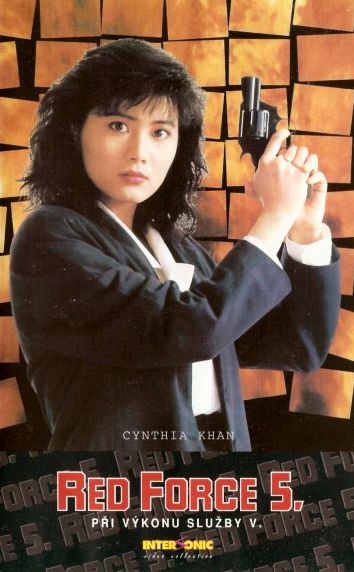 After the magnificence of Donnie Yen and Khan in its insane predecessor, the fifth installment was always going to have a tough job living up to the same standard. On its own terms, it’s perfectly reasonable, but certainly suffers in the comparison, not least because the storyline is strikingly similar. Once again, there’s an innocent who gets caught up in murky dealings between Inspector Yang Lei-Ching (Khan) and the CIA, and finds themselves on the run from a pack of assassins, unsure who to trust – except Yang, of course. In this case, it’s her cousin, David (Wu), a marine who has returned to Hong Kong, only to find himself under suspicion for espionage. In particular, being part of a Korean group, led by a man known only as ‘The General’ (Chow), who deals in Western secrets. It’s up to David and Lei-Ching to prove otherwise – if they can stay alive long enough to do it.
After the magnificence of Donnie Yen and Khan in its insane predecessor, the fifth installment was always going to have a tough job living up to the same standard. On its own terms, it’s perfectly reasonable, but certainly suffers in the comparison, not least because the storyline is strikingly similar. Once again, there’s an innocent who gets caught up in murky dealings between Inspector Yang Lei-Ching (Khan) and the CIA, and finds themselves on the run from a pack of assassins, unsure who to trust – except Yang, of course. In this case, it’s her cousin, David (Wu), a marine who has returned to Hong Kong, only to find himself under suspicion for espionage. In particular, being part of a Korean group, led by a man known only as ‘The General’ (Chow), who deals in Western secrets. It’s up to David and Lei-Ching to prove otherwise – if they can stay alive long enough to do it.
This certainly starts the right way, with Khan kicking an opponent through a car windshield, before going on to battle on top of multiple vehicles [I guess rear-view mirrors are optional in Hong Kong, since the drivers all appear oblivious to the brawl going on behind them!], Thereafter, the fights are certainly regular enough to keep the viewer interested, and by no means badly-staged: it seemed to me that a lot of them took place in fairly claustrophobic locations, such as narrow corridors. It’s a bit of a double-edged sword; while enhancing the intensity, Khan’s balletic style really needs a bit more space in order to be appreciated at its best. After the opening, she doesn’t have any standout battles until the end, where she takes on the General’s secretary (blonde Australian Kim Penn), whose skills are not limited to dictation.
The rest of the running time, there’s appears to be quite a lot of chase sequences, and definitely too much of David. The former, again, aren’t badly done: it’s just that it wasn’t boat chases which made previous entries in the series such solid-gold classics of the GWG genre, even a quarter-century later. I can’t say I was ever bored: confused, certainly, since the subtitles on the copy I was watching bore only a passing resemblance to the Queen’s English. However, there’s no denying this is significantly below the standards set by the series previously, even if its own merits still leave it worth at least a one-off watch.
Dir: Chuen-Yee Cha
Star: David Wu, Cynthia Khan, Billy Chow, Lieh Lo
a.k.a. Middle Man
Blood +: Episodes 1-25
★★
“Bloody mediocre”
 This is the third version of the same concept I’ve seen, following some years after the first animated version (released in 2000), but a couple of years before the live-action movie from 2009. What they both had over this was commendable brevity. If I’d realized the degree to which this was true, when I started the series on Netflix, I probably wouldn’t have bothered. The main problem, for anyone who has seen the other two takes, is that you know what’s going on. You’re well aware that the heroine Saya is a human-vampire crossbreed, who has now sided with humanity and dedicated her life to taking out the monsters. This was taken care of, quickly and efficiently, in the alternate versions, and we could move on to the kicking of vampiric ass. Here, however…. Not so much.
This is the third version of the same concept I’ve seen, following some years after the first animated version (released in 2000), but a couple of years before the live-action movie from 2009. What they both had over this was commendable brevity. If I’d realized the degree to which this was true, when I started the series on Netflix, I probably wouldn’t have bothered. The main problem, for anyone who has seen the other two takes, is that you know what’s going on. You’re well aware that the heroine Saya is a human-vampire crossbreed, who has now sided with humanity and dedicated her life to taking out the monsters. This was taken care of, quickly and efficiently, in the alternate versions, and we could move on to the kicking of vampiric ass. Here, however…. Not so much.
After 25 episodes – eight hours of story, even discounting credits – I still haven’t seen Saya in full-on attack mode. Indeed, I really don’t know a great deal more than I did after the first two parts, because the story unfolds at a glacial pace. A military group is trying to weaponize the “Chiropterans,” alongside a shady industrial conglomerate, Cinq Flèches. Opposing them is the Red Shield, dedicated to wiping out the Chiropterans, who can only be killed with a sword dipped in Saya’s blood. And then there is Saya’s own history: she may be a teenage girl in modern Okinawa, but she gradually remembers that she goes back through the Vietnam War, all the way to pre-Revolution Russia. Of course, telling this in chronological order would be too simple: not when she can have dramatically convenient amnesia, and recall things at whatever leisurely pace is needed by the plot.
Instead, we get a lot of chat about her not being fully “awakened” and, even more irritatingly, all the characters seem to know what’s going on, they just refuse to enlighten the audience. For instance, there’s a diary, started by the founder of Red Shield, Joel, which contains all his research; successive generations have kept it, to share with those who commit their lives to Red Shield. Do we get to know what’s in it? No, not even after Saya’s brother Kai is given the diary to read. It’s something which can be sustained for a short time, but as the episodes roll on, and information continues to be dribbled out, the approach becomes increasingly irritating. It’s a shame, since the core idea is imaginative, with scope for plenty of development, and the animation is solid, and better than I expected. There’s one wonderful episode in the middle, where an attack on a research facility unleashes children which turn into… things. I was all ready for this to be Saya’s blossoming, and the next dozen episodes to hurtle towards a thrilling conclusion. Didn’t happen.
Instead, we got more in the show’s ongoing series of inconclusive battles, with the villains muttering something dark and meaningful, before flying off into the night, and Saya recalls another incident from her past. By the time episode #25 rolled around, with the heroine finally getting to face off against the uber-mysterious Diva, I was wondering how it would all be wrapped up, but hardly unhappy to have finally reached the en… What? There’s another 25 episode chunk hidden elsewhere on Netflix? You have got to be kidding me. And, from the reviews I’ve read, these make the first batch look like masterpieces of storytelling. Don’t expect a review any time soon. Life’s just too damn short.
Dir: Junichi Fujisaku
Star (voice): Eri Kitamura, Akiko Yajima, Hiroyuki Yoshino, Junichi Suwabe
A Gun For Jennifer
★★★½
“Shitty city bang gang.”
 The back-story behind how this was made is, in some ways, more interesting than the film itself. The star and co-writer was working as a stripper, and came up with the idea, almost as a coping mechanism to handle some of the creeps with whom she had to interact. Funding came from a customer at one of the clubs. But, unfortunately, it turned out that the money he was “investing” was actually being embezzled, leading to a two-year crawl through post-production – it still hasn’t received an official release in its American home. Made in 1997, it looks like a fossil from an earlier, much scuzzier era, with both its grimy New York locations and feel harking back to the work of Abel Ferrara.
The back-story behind how this was made is, in some ways, more interesting than the film itself. The star and co-writer was working as a stripper, and came up with the idea, almost as a coping mechanism to handle some of the creeps with whom she had to interact. Funding came from a customer at one of the clubs. But, unfortunately, it turned out that the money he was “investing” was actually being embezzled, leading to a two-year crawl through post-production – it still hasn’t received an official release in its American home. Made in 1997, it looks like a fossil from an earlier, much scuzzier era, with both its grimy New York locations and feel harking back to the work of Abel Ferrara.
Allison (Twiss) heads from Steubenville, Ohio to the Big Apple to escape an abusive relationship, but ends up in far worse shape the same day she arrives. Her rape at the hands of two local sleazebags is interrupted by the fortunate arrival of a van of pissed-off and armed women, who extract vengeance of a vicious kind on the assailants – and make Allison (or “Jennifer” as she tells them she’s called) finish one off. With no other options, she joins the gang, as they work in a go-go bar, and locate other targets who have abused women. The male-dominated police refuse to believe the truth, and only NYPD homicide detective Billie Perez (Kay) figures out the connection between the crimes. She and her partner stake out one potential victim of the women, and in the gun-battle which ensues, her partner is shot dead. As I believe the kids say: shit’s getting real.
How much you take away from this will probably depend on your fondness for the grindhouse cinema to which this is a loving homage – a full decade before Robert Rodriguez and Quentin Tarantino went there. Personally, I like the take no prisoners approach, and that this is heavily tilted towards the “revenge”side of the “rape-revenge” scale. But it’s certainly rough around the edges – actually, the bits not on the edges are also pretty rough – particularly on the acting front. It seems to have been the first (and in the cases of Kay and Hoops, only) film for a lot of the performers involved: Arthur Nasacarella, as Det. Perez’s boss, has more experience, and it clearly shows. Still, on balance, its indie heart beats strong enough for me to forgive the flaws, the most obvious being that Twiss is no Zoe Tamerlis.
Dir: Todd Morris
Star: Deborah Twiss, Benja Kay, Freida Hoops, Veronica Cruz
The Chicks of Hazzard
No, it’s not a real show. Not yet. But after the Tweet below from Zoe Bell this afternoon, showing her and Kristanna Loken wielding their weaponry, I’m fully on board with the concept. We can all dream, can’t we?
Entirely convinced this photo should spawn the baddest show ever. #chicksofhazard #bonny&claudine @LokenKristanna pic.twitter.com/873AsQm1fU
— TheRealZoëBell (@TheRealZoeBell) March 13, 2014





